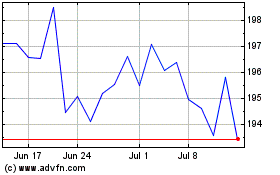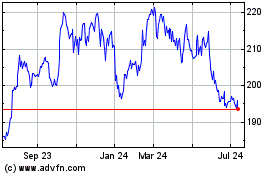CME: Resistance To ELX Rule Doesn't Raise Antitrust Concerns
September 17 2010 - 11:41AM
Dow Jones News
CME Group Inc. (CME) has denied it is broaching antitrust rules
by refusing to accept trades from a rival futures exchange.
The Chicago-based exchange operator also alleged that ELX
Futures LP couldn't be relied upon to maintain liquidity in the
Treasury futures sector during times of market stress, according to
a letter sent this week to the head of the Commodity Futures
Trading Commission.
The CFTC launched an antitrust inquiry after bank-backed ELX
Futures LP complained that CME was refusing to open its Treasury
futures market to new competition.
CME's response came this week in a 70-page letter to CFTC
Chairman Gary Gensler. The agency has been drawn into a year-long
battle between the exchanges over a new type of trade that would
let investors move futures positions from one market to the other,
challenging the CME's dominance in the Treasury futures market.
The Chicago exchange stressed that it's treating all of its
customers fairly and hasn't discriminated against those using the
ELX platform.
CME said in its letter to Gensler that it "is not organizing a
boycott of ELX, denying its products or services or otherwise
discriminating against any customers who choose to trade on ELX."
It added that "enforcement of its rules cannot be the foundation
for an antitrust violation."
Forcing CME to accept ELX's new type of trade would itself be
harmful to competition, according to CME. It said this would allow
ELX traders to rely on CME's liquidity during key periods when
activity on ELX slackens.
CME said that liquidity in ELX-listed futures contracts tied to
U.S. 30-year bonds "vanished" during the May 6 "flash crash".
Similar patterns have arisen on ELX's markets at other times,
including around the release of economic reports when market stress
is high, CME said.
These patterns can make it more expensive for traders on ELX's
markets to do business, because there are less bids and offers in
the market with which to interact, according to CME.
New York-based ELX has promoted its new transactions - known as
exchange of futures for futures, or EFF - as providing more
flexibility when managing collateral posted against outstanding
positions.
CME quickly moved to block their use on its markets, alleging
that EFF trades violate its rules and would allow ELX to take
advantage of the massive liquidity that the Chicago exchange has
built up in its most popular futures products.
ELX has claimed an average 2.2% of the Treasury futures market
since launching the contracts in July 2009, with the remainder held
by CME.
ELX Chief Executive Neal Wolkoff on Friday accused CME of giving
"lip service" to customers that are harmed by CME's continued
resistance on the issue.
"We look forward to the prompt conclusion of the Commission's
review, and believe strongly that we will and should prevail,"
Wolkoff said in a statement.
CME has sought to fend off allegations by ELX that its refusal
to let customers move futures positions between the two exchanges
via the EFF trades constitutes anticompetitive behavior in
violation of the Commodity Exchange Act.
The CFTC last month said it was opening an antitrust inquiry
into the dispute after ELX claimed CME was violating a provision in
the law requiring an exchange to avoid taking actions that might
restrain trade.
The Justice Department's antitrust division has informally
spoken with the CFTC on the inquiry, although the CFTC remains the
primary agency in charge, according to people familiar with the
situation.
ELX has argued that CME violated the antitrust core principle in
the Commodity Exchange Act because the Chicago exchange previously
issued an advisory notice to its customers warning that it would
take enforcement action if anyone attempted to carry out an EFF
trade.
-By Jacob Bunge, Dow Jones Newswires; 312-750-4117;
jacob.bunge@dowjones.com
CME (NASDAQ:CME)
Historical Stock Chart
From May 2024 to Jun 2024

CME (NASDAQ:CME)
Historical Stock Chart
From Jun 2023 to Jun 2024
